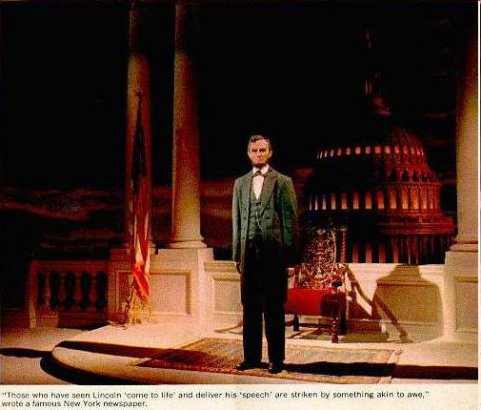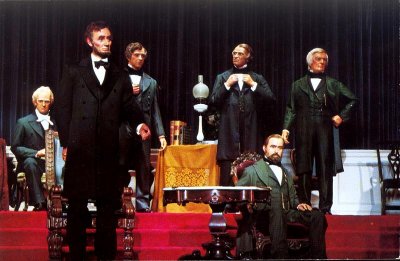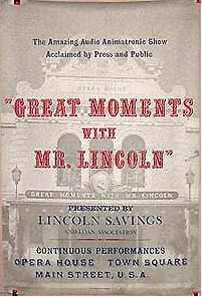|
Of the four exhibits that
Walt Disney developed for the New York World's Fair, "Great
Moments With Mr. Lincoln" was the one most dear to him.
It reflected his deep love of American history. Yet, as Paul
Anderson has noted, this love of history was anything but a mere
starry-eyed reverent nostalgia for the past. "Walt felt
that a great deal could be learned from history. He had long
held the belief that people should recognize the remarkable influence
of historical events in our lives; as he saw it, this was fundamental
for the future development of the nation. As a result he was
constantly searching for new and inviting ways to help Americans
become more aware of history's significance and lessons."
Perhaps it was no surprise
then that Disney's passion for "Great Moments With Mr. Lincoln"
and what it symbolized would make it the first of the Disney
World's Fair exhibits to open at the Anaheim theme park. In fact,
"Great Moments With Mr. Lincoln" was unique in that
the Disneyland version of the show opened on July 17, 1965, even
as the Fair's version continued to play in New York! Housed in
a handsome new facility on Main Street, the Opera House, the
production was not completely identical to the Fair's. A new
pre-show, "The Lincoln Story." replaced the Fair's
which dealt with Illinois. This featured Royal Dano as Lincoln
narrating an autobiographical sketch of himself expanding further
on the speech that closed out the original pre-show. A number
of newly commissioned murals illustrated the presentation. Guests
then entered the theater to see the same main show presentation
from the Fair, with Paul Frees narrating the introduction followed
by the Audio Animatronic Lincoln figure's speech.
SOURCE: 1967
Disneyland Souvenir Book © The Walt Disney Company
 |
As "Great Moments
With Mr. Lincoln" entertained audiences in California, advancements
in Audio-Animatronic technology made it possible to resurrect
the original idea behind the Lincoln show for inclusion in the
new Disney World park in Florida which opened in 1971. The "Hall
Of Presidents" would, according to the original 1956 Disney
vision of the "One Nation Under God" presentation,
feature life-size figures of all American presidents for its
closing sequence. Royal Dano once again performed the voice of
Lincoln and delivered a speech in the climax that incorporated
many of the same quotations featured in the "Great Moments"
show. "Hall" was an immediate success, ranking as one
of the most popular exhibits in the new theme park in its first
year of operation. Just as a single Audio Animatronic figure
of a great figure in American history had enthralled audiences
in 1964, now there were 36 such figures of every President from
Washington to Nixon on the stage to show how much Audio Animatronic
technology had advanced in just seven years. While the Lincoln
figure was the only one that spoke, his colleagues were never
static, frequently shifting about and seemingly making asides
to each other.
A scene from "Hall Of Presidents"
featuring Abraham Lincoln at Walt Disney World in Florida
SOURCE: Disney
World Postcard c. 1971 © The Walt Disney Company
 |
Ironically, the immediate
success of "Hall Of Presidents" in Florida may have
convinced Disney management that the original attraction in California
had taken on a dated aura by featuring just one Audio Animatronic
figure and would no longer be impressive to a new generation
of audiences that would demand something more elaborate. The
decision was made to close the attraction in January, 1973, the
same year that another Fair transplant, the Carousel Of Progress,
played for the last time at Disneyland. But while the Carousel
was merely changing locales for a move to Disney World in Florida,
the closing of "Great Moments With Mr. Lincoln" was
intended to be permanent. The Main Street Opera House would now
be the home of "The Walt Disney Story," a movie that
used vintage recordings of Walt Disney telling his life story
set to family photos and archival film footage. The main building
would now house Disney related memorabilia. The Disney company
thought so highly of this tribute to the founder that they also
opened the attraction in Florida as well in a specially constructed
building on Main Street.
Disney management was taken
completely by surprise when they received a volume of complaints
from customers who were furious that "Great Moments With
Mr. Lincoln" had been closed. The general tone of these
angry complaints was that, in removing the Lincoln show, Disney
management was being both unpatriotic and somehow disrespectful
of Walt Disney's memory since Walt had been so involved in making
the show possible (an ironic charge in light of the fact that
the replacement show was about Walt). The complaints continued
to the point where Disney executives felt they had to give in
and bring "Great Moments With Mr. Lincoln" back. But
because so much had been invested in "The Walt Disney Story"
it was decided to combine both productions together into a new
attraction: "The Walt Disney Story, Featuring Great Moments
With Mr. Lincoln." The foyer and pre-show would continue
to spotlight Walt and the theater would give viewers both "The
Walt Disney Story" movie (cut down from its original 28
minute length) followed by the return of the main Lincoln show
which now featured a number of new Lincoln quotations lifted
from the "Hall Of Presidents" show in Florida. This
somewhat awkward melding of the two shows, which amounted to
a lengthy running time, opened in June, 1975.
By 1984 "The Walt
Disney Story" movie had been eliminated completely from
the theater (Disney memorabilia continued to be featured in the
main building) while the Lincoln show received an upgrade with
a new, more advanced Audio Animatronic Lincoln figure. Less effective
was the decision to drop "Battle Hymn Of The Republic"
from the climax in favor of the song "Golden Dream"
from the American Adventure Pavilion at EPCOT Center in Florida.
Another element incorporated into the show from the EPCOT attraction
was the song "Two Brothers" which dealt with the saga
of brothers fighting on opposite sides of the Civil War. This
revised version, which continued to feature the original Paul
Frees narration and Royal Dano orations from the World's Fair
soundtrack, ran for the next seventeen years.
During that time, "Great
Moments With Mr. Lincoln" was frequently rumored to be closed
down, since by this time attendance levels were anything but
high. The Lincoln show was the kind of attraction from an earlier
era of Disney history where the guests were expected to have
a reasonably long attention span for a program lasting more than
ten minutes. Now, with new attractions opening in Disney parks
that stressed fast-moving thrill rides, "Great Moments With
Mr. Lincoln" was the kind of production that, fairly or
not, could easily try the patience of modern-day youth. One rumor
in 1990 had the attraction being closed to make way for a show
featuring Jim Henson's Muppets. But as was the case in 1973,
enough letters of complaint managed to convince Disney management
to keep Mr. Lincoln open, low attendance notwithstanding.
A Disneyland poster advertises
the attraction, here sponsored by Lincoln Savings.
SOURCE: eBay
Auction © The Walt Disney Company
 |
In 2001, the show was closed,
but this time to give it a major overhaul that would hopefully
allow a Lincoln attraction to endure in Disneyland for the long-term
by appealing to younger viewers. The new program that opened
in July, 2001 was a watershed moment because the last links to
the attraction's origins at the New York World's Fair were severed
for good with the elimination of the remaining Frees and Dano
vocals.
Instead of focusing on
Abraham Lincoln's life, the focus was now more on the Civil War
and a number of technological gimmicks were added to make the
attraction more interactive for the visitor (especially through
the use of headsets designed to create a bigger sound experience).
The pre-show greeted visitors to Civil War photographer Matthew
Brady who told the audience that for the show they would be taking
the identity of a Union private named Cunningham. Then they were
taken into a new main show that saw Private Cunningham meeting
Lincoln and Frederick Douglass at the White House before being
transported to Gettysburg for the battle where Private Cunningham
(the viewer) is wounded in action but eventually recovers. The
program concluded with Lincoln reciting the Gettysburg Address
(which ironically had never been part of any previous Lincoln
show, though it had been included on the expanded 1964 LP recording)
to the strains of "Battle Hymn Of The Republic." This
newest version was so far removed from its predecessors that
the program itself was renamed "More Great Moments With
Mr. Lincoln."
This overhaul at the very
least has guaranteed that a Lincoln attraction will continue
in Disneyland for some time to come. But it is perhaps safe to
say that it no longer truly represents an enduring World's Fair
legacy in terms of actual program content. It also represents
an interesting comment on how tastes and perceptions have changed
in the 40 years since the Fair. The original "Great Moments
With Mr. Lincoln" was a revolutionary breakthrough for not
just the Disney Corporation and the future of their theme park
attractions, but Robert Moses had even felt that the talking
Lincoln figure represented the greatest single thing to be found
at the Fair next to Michelangelo's Pieta. Today though,
audience tastes have changed to the point where more elaborate
gimmicks are needed to hold their attention along with, unfortunately,
a shorter program length which hinders the opportunity to do
more justice to the subject matter. Based on a reading of the
current Lincoln program script, one doesn't find the care of
using Lincoln's words to get audiences to think about how his
words still have relevance to the concerns of today. In a day
and age where the September 11, 2001 terrorist attacks have left
us feeling uneasy about our security as a nation, Lincoln's 1838
words from the "Great Moments" program still have much
to offer:
"Shall we expect some transatlantic
military giant, to step the ocean, and crush us at a blow? Never!
All the armies of Europe, Asia and Africa combined, could not
by force, take a drink from the Ohio or made a track on the Blue
Ridge, in a trial of a thousand years. At what point then is
the approach of danger to be expected? I answer, if it ever reach
us, it must spring up amongst us. It cannot come from abroad.
If destruction be our lot, we ourselves must be its author and
finisher. As a nation of free men, we must live through all times,
or die by suicide."
By contrast, "More
Great Moments With Mr. Lincoln" ultimately is concerned
more with visual flash and razzle-dazzle to bring the past alive,
and only offers Lincoln reciting his most eloquent speech, but
is nonetheless one that has little relevance to the matters of
our present age, which is why Disney avoided using it in the
first place. Even one who leaves impressed by the experience
is not likely to walk away with any sense of "history's
significance and lessons.......for the future development of
our nation." Without this critical facet, the forward-thinking
impulse of the original attraction, which neatly aligned with
the forward-thinking impulse of the New York World's Fair itself,
has been lost. For that reason, and not the mere replacement
of the last portions of the original soundtrack, the perpetuation
of a Lincoln attraction in Disneyland can no longer be seen as
a true, enduring legacy of the New York World's Fair itself.
* * *
© Copyright
2003, Eric Paddon -- reprints of this essay without permission
of the author are not allowed.
| Eric Paddon teaches American and
World History at Joliet (IL) Junior College and has also taught
History at Wheaton (IL) College. Previously, Eric has contributed
essays for nywf64.com on the Billy Graham Pavilion, General
Electric Pavilion
and Shea Stadium. You can contact Eric by e-mail at epaddon@aol.com |
|
Webmaster's note ... If you enjoyed this Feature presentation
on the Illinois Pavilion and Disney's "Great Moments With
Mr. Lincoln" show, please take some time to drop Eric Paddon
a line to let him know. His email address is epaddon@aol.com. Without Eric's research
and knowledge of the subject, it would have been a long time
before Illinois would have been featured on this website. Thank
you, Eric, for a wonderful contribution to nywf64.com.
My thanks also go to Paul Anderson
of Persistence of Vision for once again allowing me to
reprint from his excellent Disney and the 1964 World's Fair
issue of POV and for allowing us to quote from said issue at
various plances in this Feature as well. Thanks to Bill Cotter
for loaning his unique photos of the Illinois Pavilion and to
Craig Bavaro for the loan of the aerial photo of the Pavilion.
Finally, Thank You to The E-Ticket Magazine for allowing
the inclusion of the interview with Mr. Marc Davis here.
Thanks to you all for taking
the time to visit nywf64.com
and the Illinois Land of Lincoln Feature!
- Bill Young, Webmaster
- July 15, 2003
|
|